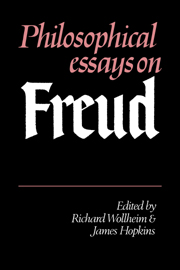Book contents
- Frontmatter
- Contents
- Introduction: philosophy and psychoanalysis
- 1 Conversations on Freud; excerpt from 1932–3 lectures
- 2 Freud, Kepler, and the clinical evidence
- 3 Critical empiricism criticized: the case of Freud
- 4 Freudian commonsense
- 5 Disposition and memory
- 6 On Freud's doctrine of emotions
- 7 The id and the thinking process
- 8 The bodily ego
- 9 Norms and the normal
- 10 On the generation and classification of defence mechanisms
- 11 Models of repression
- 12 Mauvaise foi and the unconscious
- 13 Self-deception and the ‘splitting of the ego’
- 14 Freud's anthropomorphism
- 15 Freud's anatomies of the self
- 16 Motivated irrationality, Freudian theory and cognitive dissonance
- 17 Paradoxes of irrationality
- Works of Freud cited
- Select bibliography
2 - Freud, Kepler, and the clinical evidence
Published online by Cambridge University Press: 01 October 2009
- Frontmatter
- Contents
- Introduction: philosophy and psychoanalysis
- 1 Conversations on Freud; excerpt from 1932–3 lectures
- 2 Freud, Kepler, and the clinical evidence
- 3 Critical empiricism criticized: the case of Freud
- 4 Freudian commonsense
- 5 Disposition and memory
- 6 On Freud's doctrine of emotions
- 7 The id and the thinking process
- 8 The bodily ego
- 9 Norms and the normal
- 10 On the generation and classification of defence mechanisms
- 11 Models of repression
- 12 Mauvaise foi and the unconscious
- 13 Self-deception and the ‘splitting of the ego’
- 14 Freud's anthropomorphism
- 15 Freud's anatomies of the self
- 16 Motivated irrationality, Freudian theory and cognitive dissonance
- 17 Paradoxes of irrationality
- Works of Freud cited
- Select bibliography
Summary
Whether or not we should think psychoanalysis a reasonable theory, or even a theory at all in the usual sense, depends on what we think to be the evidence for and against it, and that, in turn, depends on how we think theory and evidence go together generally. On one very influential view of scientific testing what is required in order to obtain evidence for or against psychoanalysis, as with any other theory, is that we deduce from it some claim regarding the correlation of two or more properties – which are of a kind that can be identified without using any psychoanalytic hypotheses – and then subject this claim to the rigors of statistical hypothesis testing. This strategy has been used to test psychoanalysis with very mixed and unpromising results. For several reasons, analysts tend to oppose evaluating their theory solely on the basis of such evidence. In the first place, they claim that the experimentalists' bias for easily manipulated and easily controlled factors results in an undue emphasis on testing psychoanalytic hypotheses that are peripheral to the main tenets of the theory; even worse, the hypotheses tested by experimentalists are often no more than surrogates for the genuine article, and inferences from the falsity of such ersatz hypotheses to the falsity of psychoanalysis are not legitimate.
- Type
- Chapter
- Information
- Philosophical Essays on Freud , pp. 12 - 31Publisher: Cambridge University PressPrint publication year: 1982
- 6
- Cited by



